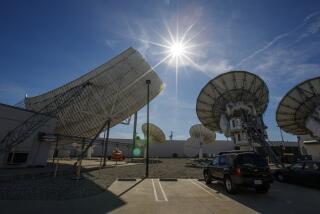Cable Firms Dish Out New Promos in Bid for Viewers
- Share via
A costly war is raging between cable television companies and their satellite TV competitors--and it’s all good news for television junkies.
The latest battle has cable companies offering to buy back satellite equipment--in some cases, taking the dishes right off customers’ roofs--if they’ll switch to cable’s premier digital service.
Although these promotions have not been widespread in Southern California, they are increasing. And they are a sign of how far these two industries are willing go to win over each other’s customers.
In June, Time Warner Inc.’s West San Fernando Valley unit began offering as much as $200 for customers’ DirecTV and EchoStar satellite dishes and receivers. Separately, the company’s South Los Angeles division launched a similar win-back effort this spring.
Other cable operators that serve parts of the Southland, such as Adelphia Communications and Charter Communications, are offering deals of their own.
Cable TV subscribers saw firsthand how heated the battle has become in May, after Time Warner knocked the ABC signal off its cable systems, depriving 3.5 million viewers of the top-rated network.
In retaliation, ABC’s parent, Walt Disney Co., promptly launched a near giveaway of satellite dishes to Time Warner customers. A chagrined Time Warner was compelled to offer rebates and premium channels to keep subscribers from defecting.
“What you’re seeing are spot fires where there’s heavy competition in certain markets,” said Sharon Armbrust, senior analyst at Carmel-based Paul Kagan Associates. “I don’t think you’ll see these promotions becoming basic practice on a national level.”
Still, it’s the best news cable customers have had in a while. Cable companies have rarely had to spend heavily to woo subscribers. When satellite TV arrived, the service was vastly superior to analog cable. There was little point in trying to win back the high-end customers willing to pay $70 or more per month for hundreds of channels.
Only as cable operators have rolled out digital service, which offers a plethora of channels and higher-quality pictures and sound, has the competition intensified.
Congress gave satellite companies a leg up late last year when it passed legislation allowing them to carry local channels, eliminating an advantage enjoyed by cable.
Industry experts say the ongoing battle is one of the first instances of the long-envisioned competition that was supposed to grow out of the Telecommunications Act of 1996. The battles are expected to become only more fierce as these rivals expand into broadband, where customers will have more choices in video, voice and data services.
All this might trigger price pressures that could benefit consumers in the long run. But the high-end customer is the early winner.
“The customers that cable is losing are the high-end customers--the premium and multi-premium customers, which are cable’s best subscribers,” said Mike Goodman, an analyst at the Yankee Group in Boston. “So, I don’t think that you’ll see price drops [for the average cable subscriber]. But with this competition, you’ll see price increases held down fairly dramatically.”
The cable companies and satellite firms have been racing to offer high-speed voice, data and TV services. Satellite was first to offer multichannel video with high-quality pictures and clear, CD-quality sound. But cable is catching up with its roll-out of digital service and has distanced itself from satellite in the all-important race to offer broadband Internet and telephone service.
“These new revenue streams are not open right now to satellite,” said Mark Cooper, research director of the Consumer Federation. “It was one fleeting moment in which satellite could discipline cable’s behavior, but it came and went. Cable is back in the driver’s seat.”
Cable has 70 million subscribers, while satellite has about 14 million, including 8.7 million who use DirecTV, which is owned by El Segundo-based Hughes Electronics Corp., a unit of General Motors Corp. Littleton, Colo.-based EchoStar has more than 4 million customers.
Satellite has been growing much faster than cable. DirecTV signed up 452,000 customers in the second quarter, 24% more than in the year-ago period. DirecTV Global Chairman Eddy Hartenstein has said the bulk of its new customers are defectors from cable.
Cable companies, on the other hand, have been adding customers at rates of about 1% to 2% in recent years, Armbrust said.
To battle back, cable companies now are willing to spend money on the “bounties,” which amount to guerrilla marketing initiatives akin to the ones satellite firms have long used to make inroads.
Time Warner’s Los Angeles units won’t reveal the number of subscribers they have snagged through their win-back promotions. But Eric Brown, vice president and general manager for the West Valley division, said his unit’s effort “has been going extremely well. We’ve been able to generate over 6,000 leads.”
Overall, Time Warner, now the No. 2 cable operator, has enjoyed great success with its digital offering, Armbrust said. “They’ve been adding [digital subscribers] hand over fist,” she said. Digital subscribers pay about $10 more than analog subscribers each month.
AT&T; Corp., which became the No. 1 cable operator with its acquisition of MediaOne Group Inc.--one of the biggest operators in Los Angeles--recently launched a win-back promotion in Denver and Salt Lake City and is looking into expanding it to other markets. The company said about 700 customers in Denver have capitalized on the promotion, in which customers get a $200 rebate in the form of four $50 credits to their digital cable bill.
AT&T;’s digital services vary in price from about $39 to $79, depending on how many premium channels a customer wants. Adelphia Communications has signed up more than 1,400 former satellite customers in the Los Angeles area through its win-back program this year, said Lee Perron, the company’s vice president of corporate affairs.
With these deals, cable operators are moving from spending $50 on average to lure new subscribers to about $250 per subscriber.
That’s still much less than the average new-subscriber acquisition costs of DirecTV (now $525) and EchoStar ($450). And, of course, the cable operators plan to make up the money over time.
More to Read
The biggest entertainment stories
Get our big stories about Hollywood, film, television, music, arts, culture and more right in your inbox as soon as they publish.
You may occasionally receive promotional content from the Los Angeles Times.










